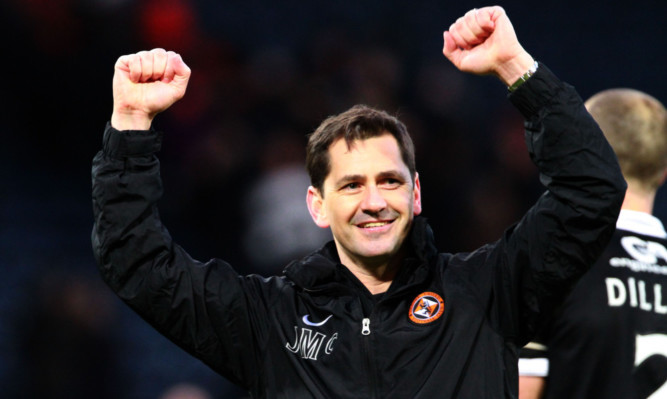Jackie McNamara could have done a Harry Redknapp and claimed the knees needed a bit of attention.
He could have cited an overwhelming desire to write his second sitcom.
Or, like an Allan Johnston, he could have resigned the old-fashioned way.
If managers don’t agree with their board’s transfer strategy, they call it a day. It has ever been thus.
McNamara though has stood shoulder to shoulder with his chairman over the deadline day departures of Stuart Armstrong and Gary Mackay-Steven. And the best news for Dundee United fans waking up the morning after a traumatic night before is that their head coach is in it for the long haul.
If McNamara had just been towing the party line when he faced the media first thing on Tuesday, he gave an Oscar-winning performance in delivering a thoughtful, even-handed and convincing assessment of the situation United (and the two players) found themselves in.
He might be able to write a script, but he’s never been known as an actor, so I think we can take it as read that McNamara believed that selling was the right option.
That doesn’t mean he hasn’t got the right to be selfish.
Managers don’t last long at football clubs.
McNamara has been at Tannadice for just a few days over two years, but already he’s the longest-serving boss in the Premiership.
Custodians can, and should, think decades ahead. Managers have to buy into that, but they can also be excused a bit of short-termism as well.
The success of a Dundee United manager in 10 years’ time isn’t his concern, nor would you expect it to be.
It may seem like it just now, but cup finals don’t come along every year. And, having lost one already, McNamara doesn’t want a second defeat on his CV.
His team are playing an Old Firm side in the final of a national cup competition in a few weeks. Beat Celtic, and he’ll be looking at high-end Championship clubs in England or low-end Premier League ones for his next job. Whisper it, but a return to Parkhead as Ronny Deila’s successor could also be a possibility.
Lose heroically and his reputation will be fine. But lose convincingly with a Scottish Cup final-like performance and he’ll be in danger of being typecast as a man whose teams flop on the big occasion.
So McNamara needs a strong team on the Hampden pitch, and if he really believed that Armstrong and Mackay-Steven being taken out of his starting XI would significantly hurt their chances, I’m convinced he would have persuaded Stephen Thompson not to part with at least one of them.
So, part of the explanation for McNamara accepting the exits with such admirable grace could be that he doesn’t actually think it is as concussive a blow as many perceive it to be.
The two players who disappointed most against St Johnstone at Celtic Park were the two who will now call the ground home.
The Saints match passed Armstrong by, and he was so distraught at his own display that he could barely look anybody in the eye as he trudged on to the United team bus. Mackay-Steven was equally anonymous, and when Dave Mackay left his mark on him, GMS was never seen as an attacking threat again.
May 17 is the only evidence we’ve got of whether the pair are big game players. They could of course have used it as motivation to make sure there was no repeat, but they could just as easily have gone into their shells again.
Nadir Cifcti’s absence will be felt more keenly at Hampden than Armstrong or Mackay-Steven’s.
If you look at the transfer window in the round, rather than the last few hours of deadline day, the United squad that came out the other side isn’t significantly weaker. I wouldn’t go so far as to say it’s stronger. But certainly not as badly affected as most in the Premiership would have been if they had over £2m worth of talent stripped away.
McNamara’s unflustered demeanour suggests that he is as committed to United as he was two years ago, and that he feels the League Cup final is as winnable as it was this time last week.
